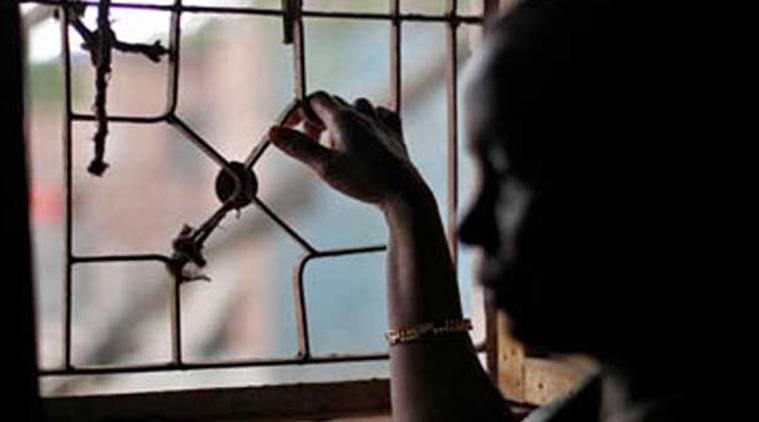 Though the lockdown has delivered a blow to the livelihood of all those employed in the informal economy, female domestic workers have always been an exploited and vulnerable workforce leading a financially unstable life. (Representational)
Though the lockdown has delivered a blow to the livelihood of all those employed in the informal economy, female domestic workers have always been an exploited and vulnerable workforce leading a financially unstable life. (Representational)
For Shridevi, 35, who worked as a domestic help at three houses until the imposition of the lockdown, the most distressing part of her day is hearing her three children groan in hunger till 2 pm, when she and her family stand in line under the merciless afternoon sun for half kg cooked dal-chawal. “As soon as we finish that meal, my children are hungry again because it is not nearly enough to curb their hunger. So we wait until late evening, when we get the same cooked rice and chana dal in the form of khichdi,” says Shridevi, who lives in a single room with her family of five in the Sector 52 Rehabilitation colony, close to where a COVID-19 case was reported a few days ago.
Though the lockdown has delivered a blow to the livelihood of all those employed in the informal economy, female domestic workers have always been an exploited and vulnerable workforce leading a financially unstable life. “They are an extremely marginalised and invisible workforce, both due to the nature of their work and their gender. There are so many of them, each ready to work for incredibly low pay, hence they have always been disposable and exploited,” says Dr Seepana Prakasam, an economics professor from DAV college, who authored a book titled “Domestic Women Workers in India: With Special Reference to Chandigarh” in 2012.
“During the lockdown, the lack of social security and benefits such as paid leave will take a severe toll on these workers, since they are left at the mercy of their employers for money,” adds Dr Prakasam. Indeed, since most of these workers have lost their jobs due to the lockdown, with employers hesitant to let them into their house, they have been without pay since the past month. “Many of us were paid for March, but our memsahabs aren’t sympathetic enough to pay us for April. My employer called in once and asked if we were ok, but didn’t offer any help financial help,” says Kiran, another domestic worker and resident of Sector 52, who used to earn Rs 5,000 a month cooking for a household.
Domestic workers say that their employers have refused to provide payment for April and give no guarantee that they will be rehired post the lockdown. “I don’t know if I will be hired back and receive payment after this ends. My employer said she will call me in June. There is no certainty,” says Shridevi, whose husband, a daily wage labourer, is also bereft of employment since mid-March. Her three school going children, are hungry and listless, spending crucial developmental years without proper education. “Their school is sending some coursework via phone, but the screen is so small, they are unable to learn anything,” adds Shridevi.
Residents laying off domestic workers
A Panchkula resident explains that even if the lockdown ends soon, she will hesitate to immediately hire back domestic help. “I paid her for the month of April, but since I don’t know when I will need her back again, I won’t pay her for May. I have decided to let her go because we have learnt to manage household chores ourselves and I am worried of the infection she might bring to the house, since these people live in such unsanitary spaces,” she says.
According to a sociologist from a Panjab University college, who has done extensive work in class and caste relations in India, the spread of COVID-19 will further propagate anxieties around sanitation and hygiene standards among the working-class population, stealing employment opportunities from them even after the lockdown ends. “Caste and class are inextricably intertwined and the myth of the working class being unhygienic is tied to age old caste discrimination, where Dalits were believed to be unhygienic and unsanitary. COVID-19 will propagate that myth even further, as working-class employees are seen as super spreaders, their colonies seen as cesspools of infection,” says the sociologist, who wishes to remain anonymous.
Dr Prakasam’s statistical research affirms the relation between caste and class amidst the population of domestic workers in Chandigarh. “Out of the total population of female domestic workers, almost seventy per cent belong to scheduled castes in Chandigarh. They belong to sub castes such as Valmikis and Chamars, and most of them are migrants from Uttar Pradesh,” says Dr Prakasam.
Workers without ration card
On top of the hardships faced by these female domestic workers due to a loss of livelihood, many of them do not even have ration cards, which would have enabled them to avail the benefit of receiving five kg grain under the National Food Security Act. According to data collected by Dr Prakasam in 2013, about 50 per cent of these women did not possess ration cards, since it required residency proofs and documentation which are often hard to figure out by the mostly illiterate population.